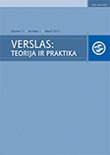The Determinants of the Competitiveness of Lithuanian Export: Macroeconomic Approach
The Determinants of the Competitiveness of Lithuanian Export: Macroeconomic Approach
Author(s): Rita Remeikienė, Ligita Gasparėnienė, Alius SadeckasSubject(s): National Economy, International relations/trade, Economic development
Published by: Vilnius Gediminas Technical University
Keywords: export; factors; Lithuania; competition; macroeconomic environment; determinants;
Summary/Abstract: The development of an appropriate export promotion strategy in any country calls for consideration of such countrylevel determinants as macroeconomic indicators and cultural elements. Small economies, like Lithuania, must have a clear understanding of which macroeconomic factors most significantly contribute to the competitiveness of their exports. This article is aimed at assessment of the competitiveness of Lithuanian export in the macroeconomic context. The main purpose of the research is to assess the determinants of the competitiveness of Lithuanian export in the macroeconomic context. For accomplishment of the defined purpose, the following objectives were raised: 1) to review the general determinants of export competitiveness; 2) to develop the methodology for assessment of the country’s export competitiveness in the macroeconomic context; 3) to empirically assess the impact of macroeconomic determinants on the competitiveness of Lithuanian export over the period 2007–2015. The research methods include comparative and systematic literature analysis, correlation and regression analysis. It has been found that GDP (gross domestic product) per capita and general state’s revenue from taxes and social contributions explain the trends of Lithuanian export by 99.1 percent. A very strong correlation has been estimated between Lithuanian export and terms of financing for exporting enterprises, a negative medium-strong correlation has been estimated between the country’s export and its general tax level, while a positive medium-strong correlation has been captured between the country’s export and its minimum wages. Novelty. The results lead to the conclusion that the competitiveness of Lithuanian export is mainly affected by the state’s tax policy, terms of financing for exporting enterprises and social wage strategies. By improving the above-mentioned areas, the country could occupy stronger competitive positions in international markets.
Journal: Verslas: teorija ir praktika
- Issue Year: 20/2019
- Issue No: 1
- Page Range: 170-178
- Page Count: 9
- Language: English

